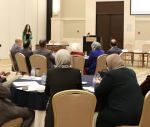You are here
Solidarity with refugees has a new blueprint
Dec 17,2019 - Last updated at Dec 17,2019
GENEVA — At the cusp of a new decade, the world remains gripped by multiple refugee crises. Yet, so far, the international response has been piecemeal and unbalanced, with poor and middle-income countries shouldering the lion’s share of responsibility.
Venezuela is beset by a severe political and humanitarian crisis, and gang violence and abuse are rampant in parts of Central America. Syria, South Sudan and the Central African Republic are embroiled in violent conflicts, while the people of Afghanistan and Somalia have endured decades-long crises. In Myanmar, a revival of the decades-long repression of the Rohingya has displaced hundreds of thousands. Add to that extreme poverty and climate-related pressures, in Africa’s Sahel region and elsewhere, and it is little wonder why the number of displaced people has been rising fast.
Today, there are close to 26 million refugees and 41 million internally displaced people. Some have been uprooted for months, others for years or even lifetimes. They are on every continent, often in regions that are particularly vulnerable to climate change. They can be found in rural villages and, more commonly, in or near cities. Reflecting the broader urbanization trend, 61 per cent of refugees live in urban areas.
Refugees are most likely to head to nearby countries, which, despite lacking significant wealth, robust infrastructure, or other public resources, have largely accepted them. As it stands, poor and middle-income countries host 84 per cent of refugees. Thanks to their generosity, and that of inundated local communities, millions of lives have been saved.
Despite the high costs, including severe strain on public services and budgets, several countries have taken steps to empower and include refugees, enabling them to attend school, find employment, run businesses, acquire land, access healthcare, learn the local language and contribute to their host communities. These governments may not have a lot of resources, but they understand that refugees are fleeing from problems that they did not create and cannot solve.
Nonetheless, many host countries struggle to provide decent living conditions for refugees, let alone opportunities for formal employment and education. As a result, refugees often languish in makeshift camps that fail to meet basic needs, from clean water to physical security. Humanitarian aid helps, indeed, it is essential, but it is not enough to turn despair into hope.
As a result, some, though, relatively speaking, not many, undertake long and often perilous journeys to developed countries. And yet, when they arrive at the rich world’s doorstep, the welcome they receive is increasingly mixed, as manufactured panic over supposedly massive influxes of “dangerous” outsiders closes the space for humane, pragmatic responses. Responsibility-sharing, the foundation of the modern international system for protecting refugees, is replaced by responsibility-shifting, usually onto countries that are least able to cope.
It is time to reboot global efforts to protect refugees. What is needed is a comprehensive strategy with global reach, reflecting a sweeping vision that inspires and engages governments, the aid community, businesses, development institutions, civil society, faith groups, academia, sports and the arts.
As luck would have it, we already have just such a plan: The Global Compact on Refugees, which was agreed by the United Nations General Assembly almost exactly a year ago. Forged from decades of experience by host governments, aid workers, donors, businesses and refugees, the Global Compact recasts age-old traditions of welcoming and sheltering strangers to meet the reality of today’s interdependent world. And it offers practical ideas and arrangements for addressing every facet of the refugee challenge.
The Global Compact is thus a blueprint for building effective support systems for refugees and host communities. It requires comprehensive action plans for assisting frontline countries; development policies that help refugees and host societies thrive; fair and predictable legal pathways to resettlement and safe means of repatriation.
The right to asylum must be upheld, and not only in zones near conflict. Denying people that right, by building border walls and fences or enacting policies that keep asylum-seekers waiting in detention centers or dangerous conditions, is not only inhumane; it will never curb refugee flows. To achieve that, countries must identify and address the root causes driving people to flee.
The same goes for migrants. Today’s world is characterized by “mixed flows” (including, say, economic migrants), a reality that opportunistic politicians often distort to minimise the plight of refugees. The Global Compact for Safe, Orderly and Regular Migration, a complement to the Global Compact on Refugees, provides valuable guidance for dealing with this complex reality.
Host countries in the developing world have proved that welcoming, supporting, and even benefiting from refugees is possible. Now, their successful policies and practices must be replicated on a larger scale, with the help of the entire international community.
The good news is that international and regional institutions are already stepping up, in a big way. For example, the World Bank has introduced new favorable financing mechanisms for host countries. New partnerships, involving the private sector, governments, financial institutions and development investors, are transforming remote refugee settlements and their surrounding communities into hubs of agriculture, commerce and connected learning.
But more must be done, beginning at this week’s Global Refugee Forum. Governments, business leaders and civil-society organisations should, and, one expects will, make significant pledges. Moreover, participants will have a rare opportunity to share experience and exchange ideas, for example, about how best to use technology to model climate-driven migration and assist the displaced, or about potential partnerships to protect refugee children. They will also hear from refugees themselves. Ultimately, this event should reinvigorate global efforts to manage today’s refugee crises.
Solidarity has a new blueprint. Let us use it to build a more stable, prosperous and principled world.
Filippo Grandi is United Nations high commissioner for refugees. ©Project Syndicate, 2019.
www.project-syndicate.org












